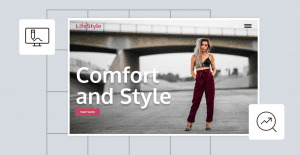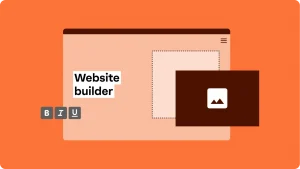Key takeaways:
- Choosing a web design company requires you to first define your own business’s needs, budget, and timeline to ensure a good match.
- A professional web design agency offers benefits beyond aesthetics, including access to a team of experts, custom design, and integrated search engine optimization (SEO) strategies.
- When choosing agencies, look for a comprehensive portfolio, a solid reputation, transparent pricing, and ongoing support.
If you have some basic web design and development knowledge, you could start building your own website using a DIY website builder. However, as your business grows, you’ll likely have to update and change your website. Incorporating these changes can become challenging and time-consuming when working with a template to update and change your website. Incorporating these changes can become challenging and time-consuming when working with a template.
This is where web design companies come in. They create, develop, and maintain websites for clients, with design, development, SEO, content creation, and ongoing support services.
But let’s be honest, choosing the best one can be overwhelming. How do you sift through countless agencies, each promising the moon and stars? How do you ensure you get a stunning website that drives results?
This guide will walk you through the important steps of choosing a web design company, providing advice to help you make an informed decision. We’ll cover key factors, potential red flags, and questions to ask so you can choose the right web design agency that understands you and helps you achieve your online goals.
Find the perfect domain
Ready to register a domain name? Check domain availability and get started with Network Solutions today.
How to choose a website design agency
Choosing a website design agency requires careful consideration to ensure you find the right fit for your needs. Here’s a step-by-step guide to help you make an informed decision.
- Research the company
- Narrow down the list
- Identify your website must-haves
- Know your timeline and budget
- Reach out to the shortlisted agencies
Step 1: Research the company
Look for top web design agencies with a good reputation and proven track record in web-related skills such as design, development, SEO, and digital marketing. Check their website for information about their history, services, team, and client testimonials. Also, read reviews on sites like Google and social media to get a good idea of what people think about them.
Step 2: Narrow down your list
Once you have a list of potential web design companies, narrow it down to the best three to five. Then, check out their portfolios to see examples of their past work. Look for companies that use a variety of design platforms, as this will give you more options and flexibility.
Many web design companies may do great work, but their design style may not fit your business. It’s important to find one that understands your industry and can create a website that speaks to your target audience.
While finding a company that has worked in your industry before is a plus, don’t eliminate other agencies too soon, especially if you love their work. The most important thing is to find a company you feel comfortable working with and believe can create a website to help you achieve your business goals.
Step 3: Identify your website must-haves
Before talking to web design agencies, list your website must-haves. What functionalities are important for your website? Do you need eCommerce capabilities, a robust content management system (like WordPress or Drupal), or specific integrations? These are some things you must consider early on.
A list will also help you during the process of choosing an agency. It will also ensure you don’t forget important things when discussing with them. It will help you quickly narrow your options to the agencies that meet all your requirements.
Apart from the must-haves, consider making a second list. This list can have things you’d like but aren’t absolutely necessary. For example, logo design, secure website hosting, or content creation might be on this list. These things can help you decide between agencies if everything else is similar.
Step 4: Know your timeline and budget
It’s important to clearly understand how much you’re willing to spend on your website and when you need it ready to find the right web design partner.
On the money side, setting a range rather than a fixed amount for your budget is a good idea. Also, ask the potential design partners about what’s covered in their cost estimate and how they handle extra charges for services not included.
For comparison, here’s a table you can reference for estimated web design costing, based on service provider:
| Type | Cost range | Pros | Cons | Best for |
| Freelancer | $500–$5,000 | Lower cost, flexible schedule | Limited resources, may lack SEO expertise | Small businesses with simple sites |
| Small agency | $3,000–$20,000 | Balanced expertise and personalization | Less capacity for very large projects | Businesses needing design + marketing |
| Large firm | $10,000+ | Full-service, advanced capabilities | Higher cost, less personalized | Enterprise-level projects |
On the time side, consider when you need the website to be up and running. Let the design agencies know if there’s a specific deadline, like a big industry event or product launch. Ask them if they can realistically meet that deadline and if they foresee any challenges. Also, find out what they’ll do if they can’t meet the timeline you’re hoping for.
Our web design experts can provide a complimentary consultation to discuss your project.
Step 5: Reach out to the shortlisted agencies
Now that you’ve identified your top picks, it’s time to get in touch with them to see if they fit your needs. Some companies may look good online, but they may not be as good as they seem when you talk to them.
A good web design agency will take the time to understand your vision for your website and be transparent about its web design process and pricing. They will also be committed to producing the best quality work that fits your online brand.
It’s also important for you to know what you’re looking for in terms of design and content. What do you like and dislike about your competitors’ websites? What are your goals for your website? By clearly explaining your wants, you can communicate better with your web design agency and get the desired results.
Here are some questions you can ask your prospects.
- Can you provide examples of websites you’ve designed that are similar to what I’m looking for?
- What is your typical process for designing and developing a website? Can you walk me through the key steps?
- How do you ensure your websites are responsive and work well on different devices and screen sizes?
- How long does it typically take to design and develop a website of this scope?
- Can you provide a detailed breakdown of the costs associated with the project?
- Can you provide references from past clients that I can contact for feedback?
By asking these questions, you can better understand the agency’s capabilities and how they can help you achieve your goals.
Lastly, look out for these red flags when you finally contact your shortlisted agencies.
- Guarantees #1 Google ranking in a short time. Ranking in Google takes time; it takes time for high-volume keywords to rank compared to 2017. While there’s no set timetable, for reference, pages in Google’s top 10 are more than 3 years old.
- No portfolio or unwilling to share past work. Without a portfolio, you cannot gauge whether or not company personnel can demonstrate skills necessary for your company to stand out.
- No clear contract or payment terms. Having clear payment terms is important and will help avoid misunderstandings. Terms should include how the payments will be made, interest, and any special terms.
- Uses outdated or non-responsive designs. Websites with outdated or non-responsive designs don’t offer a good user experience and therefore repel customers. Hiring service providers that cannot cope with industry standards can hurt your success potential.
- Avoids giving a written scope of work. Without a written scope of work, the probability of miscommunication arises. You may expect they’ll cover all aspects of web design or even additional marketing, which they may not offer at all.
Before availing services, make sure your shortlisted agencies are transparent with their work and keep good records of your transactions and terms.
Create web designs with Network Solutions
With Network Solution’s website design service, you get a dedicated team of professionals working closely to understand your business and create a website that meets your needs. Our experts have experience in designing websites that not only look great but also function smoothly. We ensure your website is user-friendly and optimized for search engines, helping you attract more visitors.
Benefits of hiring a good web design agency
While it might be tempting to create your website yourself, partnering with a professional web design team offers the following advantages:
- Gain access to more resources
- Get professional, custom web design
- Rank higher in search engine results
- Increase website conversions
- Build brand trust
Let’s expand on each benefit below.
Gain access to more resources
Building a website can be a lot of work. Not only do you need to make a professional-looking website, but you also need to create high-quality content, optimize your website for search engines, and maintain it regularly.
Working with a web design agency gives you access to a team of experts who can manage all aspects of website building. This allows you to collaborate with professional web designers to ensure the website’s appearance matches your brand and caters to customer needs. The agency’s experienced copywriters can generate all the necessary web content, sparing you the need to find writers within your company.
Even after the website goes live, it needs regular fixing and updates. Trying to do all these tasks yourself can distract you from other important work your business needs to do.
Get professional, custom web design
Web design isn’t just about making a website look aesthetically pleasing. It’s also about creating a functional, effective website that aligns with your business’s goals.
A professional web designer will work with you to understand your business, target audience, and goals. They will then use this information to create a website that meets your needs and helps you achieve your goals.
By investing in professional, custom design, you can do the following.
- Enhance user engagement. A professional web designer creates a user-friendly website that encourages visitors to explore and spend more time there. This increased engagement allows users to learn more about your business, products, and services.
- Build a strong brand identity. A well-designed website aligns with your brand’s image and values, creating a memorable and unique online presence. This distinct branding sets you apart from competitors and leaves a lasting impression on potential customers.
- Get higher conversion rates. Ultimately, you want your website to generate results for your business. Whether you want customers to complete an online purchase or sign up for your monthly newsletter, the goal is to get visitors to take action. Calls-to-action are elements that, when used properly, encourage more users to convert. Working with a professional web designer eliminates the guesswork, which helps you create a site that turns more visitors into customers.
Rank higher in search engine results
A professional website designer will create your website with SEO in mind. This involves using smart design techniques and up-to-date strategies to make it easier for potential customers to find your site when searching for relevant keywords.
Here are a few things your web design agency might do to help with your SEO strategy.
- Make the website user-friendly. An intuitive and responsive web design helps people and improves your website’s ranking in search engines. A well-designed website should have a good layout, content, and fast loading time.
- Use keywords strategically. Using the appropriate keywords on your website is a big part of good SEO. Finding these words, putting them on your site, and monitoring how well they’re doing takes much time and work. Instead of doing this all by yourself, the SEO team at your agency can take care of it.
- Reach local customers. Local SEO is really important if you want to reach people in your local area, particularly those who are willing to buy your products or hire your services. The SEO team at your agency can help your website show up better in searches in your area and gain more organic traffic.
Explore our SEO-friendly web design services if you want your business to be found by more customers.
Increase website conversions
The ultimate purpose of a website is to attract visitors, allowing them to explore further and understand a business’s offerings. However, visitors might leave for a more seamless experience elsewhere if a website is confusing or complicated.
Professional web designers play a big role in helping a business achieve its objectives through effective website design. They ensure the website is organized to guide visitors toward specific actions, such as purchasing or signing up. These designers also know how to strategically position call-to-action (CTA) buttons on different pages to maximize the chances of turning visitors into customers.
Build brand trust
Sure, you can create your website by yourself. However, it might not be dependable. Since you’re not an expert in web design, you might not realize there are issues until it’s too late.
For instance, your website could run well for a while. However, when you try to make changes, it could suddenly stop working or cause other issues. You might not understand why your website doesn’t work right. This can lead to frustration and a negative experience for your visitors. You might spend a lot of time and effort trying to fix these problems, and in some cases, you might even need to hire someone to help you sort out the mess.
Ultimately, a poorly functioning website can harm your reputation and business. That’s why working with a professional web design company is a smart choice. They have the expertise to create a website that works smoothly and reliably, establishing your credibility in the industry.
What to look for in a website design agency
Before you get convinced by their ads and promises, you need to do your due diligence when choosing a web design agency. Here are things you must look for and highly consider when comparing agencies:
- Domain name registration and website hosting
- A broad design portfolio
- Sophisticated functionality
- Flexibility and adaptability
- Additional marketing services
- Solid and reputable experience
- Ideal service value that matches pricing
- Ongoing support and maintenance
Domain name registration and website hosting
A web design company with an all-in-one package that includes your website domain registration and secure website hosting means there’s less to consider—so you have more time to spend on your business.
A broad design portfolio
Look at the web design company’s previous work, including DIY website templates and custom-built websites. Do they have plenty of experience designing websites for your industry? For instance, a company focusing on eCommerce websites may not be the best choice if you’re launching a service business. Consider the company’s track record and how long they have been in business.
Sophisticated functionality
Websites must do more than just look good—they must function well. In addition to design, consider the features and tools a web design company offers. For example, no matter what industry you’re in, customers increasingly use smartphones and tablets to make purchasing decisions.
According to recent data, mobile devices now account for over 55% of all website traffic worldwide. That means your website needs to be mobile-friendly and function on a mobile device and desktop.
Flexibility and adaptability
Choose a company that can tailor its web design services to meet your goals and branding requirements. Assess its ability to create custom designs that align with your vision and brand identity. Ensure it is open to revisions and adjustments throughout the design process.
Additional marketing services
Choosing a web design company offering various online marketing services can greatly simplify your life. You’ll have one team to help with everything from SEO to pay-per-click advertising (in addition to your website design). Web copywriting services, professional business email addresses, social media marketing assistance, and implementation of website analytics tools are other services to ask your web design company about.
Solid and reputable experience
New website design companies pop up all the time. Choosing a company with decades of experience in online marketing can give you the confidence that your new business will be in good hands. For instance, Network Solutions has been a trusted partner in web services since 1979, providing a long history of expertise and reliability.
Good references
Before making a final decision, talk to other business owners who have used the same web design company you’re considering. How satisfied are they with their website design and functionality? What additional features or services do they use, and how well are these working for them? Would they make the same choice today if they had it to do over again?
Ideal service value that matches pricing
Obtain detailed pricing information and understand what is included in their packages for your specific web design project. Compare the value you receive with the cost and assess the company’s transparency in pricing. Be cautious of excessively low-priced options that may compromise quality.
Ongoing support and maintenance
Inquire about post-launch support, website maintenance, and updates. Ensure they offer reliable technical support and assistance when needed. Consider long-term partnerships and their ability to accommodate future growth and scalability.
Get started with your website design today
Finding a good web design company for your business and brand takes time and research. The more careful consideration you give before deciding, the more likely you’ll be satisfied with the outcome. Choosing the best website design company is essential, as they play a key role in creating a website that effectively represents your brand.
Let Network Solutions be your partner and help bring your designs to life. Our team of web design and digital marketing experts can bring your vision online, whether you’re starting a blog or an eCommerce store.
Call us at 1-866-888-6302 to start growing your business online today.
Frequently asked questions
Choosing the right web design company starts with understanding your needs and goals. Identify your website type, desired features, and budget. Research potential companies, review their portfolios and client testimonials, and ask about their experience, design process, and pricing. Look for a company that communicates well, understands your vision, and offers ongoing support.
Review their past sites for mobile responsiveness, page speed, and keyword optimization. Ask about their SEO process during consultations.
If you’re looking for an individual web designer, focus on their skills and experience in areas relevant to your project. Ensure they understand your needs and can deliver a website that meets your expectations.
Both can work well. Local agencies offer face-to-face meetings, while remote agencies may offer broader talent pools and competitive rates.
The cost of hiring a web designer varies widely depending on factors like experience, project scope, and location. On average, you can expect to pay anywhere from $30 to $200 per hour for freelance web designers. For simple websites, the total cost might range from $500 to $5,000, while more complex projects can cost upwards of $10,000 or more.
The cost of a professionally designed website depends on its complexity, features, and the agency’s pricing structure. Simple websites with basic functionality might start around $1,000, while e-commerce sites or those with custom features can start from $10,000.
A web designer focuses on the look, layout, and usability. A web developer handles the coding and functionality. Some companies do both.




